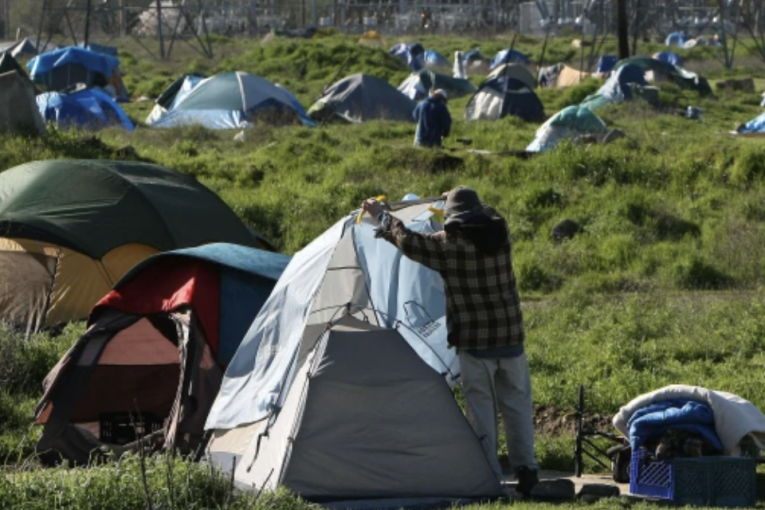

By Cres Vellucci Jr.
Vanguard Sacramento Bureau Chief
SACRAMENTO, CA – Key homeless community support groups revealed this week they are asking a judge to require the Sacramento County Registrar of Voters to pull a “deceptive” proposition dealing with the unhoused from the November ballot because it is unconstitutional and was placed “reluctantly” on the ballot by a Sacramento City Council that “caved” in to heavy pressure by the business community.
Area Congregations Together, Sacramento Housing Alliance, Organize Sacramento, Regional Coalition to End Homelessness and Sacramento Homeless Union asked the court to axe the “Emergency Shelter and Enforcement Act of 2022” (ESEA), which they charge “authorizes the City to criminally punish homeless people for camping on the City’s streets and public spaces.”
A superior court judge has agreed to hear the petition in an expedited fashion Aug. 23.
The pleading, filed by civil rights attorney Mark Merin, insists homeless could be arrested if they refuse “newly created, but as yet unidentified, sites on public or City-leased property that can accommodate ‘outdoor tent and partially enclosed’ structures.’”
The proposed ordinance, said the filing, was “reluctantly enacted by the Sacramento City Council” after a “consortium of businesses” threatened to “place its draconian budget-busting initiative on the ballot if the Council did not immediately pass its own unfinished draft ordinance for ballot placement.”
Although the council asked for more time to improve its own ordinance, the business “consortium” refused and the “council caved to this pressure and voted (7 to 2) to pass the ESEA, with minor technical changes, for the 2022 general election,” according to the pleading.
The court papers ask a judge—the only one who can modify election materials at this point—to force election officials to “withdraw ESEA and redraft it in accordance with the (Martin v. City of Boise) holding. Barring that, this court should enjoin the County Registrar of Voters from printing the ordinance and ballot arguments about it and mailing same to voters for the November 8 general election.”
The filing by the unhoused advocates said leaving the measure on the ballot would “constitute a deception on the voters for a court to permit a measure to remain on the ballot knowing that a provision key to its validity and most likely to excite the interest and attention of the voters, is itself invalid.”
To that point, quoting Martin v. City of Boise (9th Cir. 2019) 920 F.3d 584, the homeless groups charge the proposed ordinance “violates the Eighth Amendment as incorporated and made applicable to the states by the Fourteenth Amendments due process clause…insofar as it imposes criminal sanctions against homeless individuals for sleeping outdoors, on public property, when no alternative shelter is available to them.” 
They claim the City of Boise case provides that “alternative shelter” means “indoor,” not “outdoor” shelter and, again quoting Boise, “[A]s long as here is no option of sleeping indoors, the government cannot criminalize indigent, homeless people for sleeping outdoors, on public property, on the false premise they had a choice in the matter.
“This is the very vice of Sacramento City’s ESEA Ordinance and why it should be barred from the ballot,” said the Sacramento pleading, which claims, “ESEA is analogous to, if not modeled on, a portion of the (Boise) opinion, that portion mentioning the constitutional necessity for providing sufficient numbers of alternative shelter spaces available to homeless persons before they can be criminally punished for sleeping or camping on certain public property.
Boise, they argue, “emphasizes and clarifies that the alternative shelter must be ‘indoors,’ while in contrast ESEA specifies that some sites of at least 70 square feet (the average size of a California prison cell) the City provides as an adequate alternative can be ‘enclosed or partially enclosed,’ and others, of at least 100 square feet, can be made available for a relocated person to ‘camp.’”
The plaintiffs also note, “Notably, the ordinance is silent about the number of sites the City intends to provide for ‘camping’ in comparison to the number of ‘partially enclosed’ sites to be provided, equating each as constitutionally sufficient to comply with (Boise) when they obviously are not. Indeed, since a ‘partially enclosed’ shelter space is defined only as having a ‘bed and roof,’ they too seem more ‘outdoors’ than ‘indoors.’”
The filing maintains, “The City and its officials are well aware of Martin, having unsuccessfully opposed its scope and application to the City’s own practice of punishing homeless people for ‘camping’ on public…(n)onetheless, in amending ESEA…it ignored” the Boise case that there must be ‘adequate alternative shelter’ indoors for homeless persons before criminally citing them for camping on public places.”
“This is not ending homelessness. This is not problem-solving or solution building,” said Crystal Sanchez, the president of the Sacramento Homeless Union.
City Council Member Katie Valenzuela, who opposed the measure in the 7-2 vote, said Tuesday, “We do (want) safe camping and safe parking, but what this is talking about is making that the shelter goal, which is not the shelter goal. The shelter goal is inside. Inside is what stabilizes people. Inside is what keeps them safe from the elements and really allow us to set them up for success.